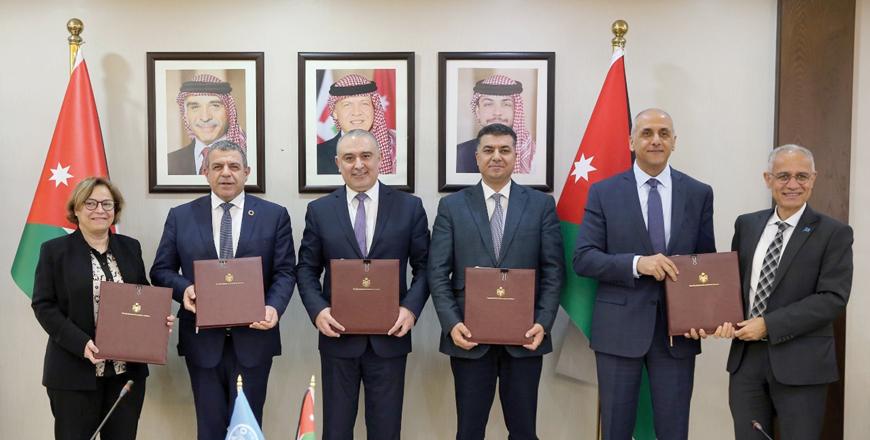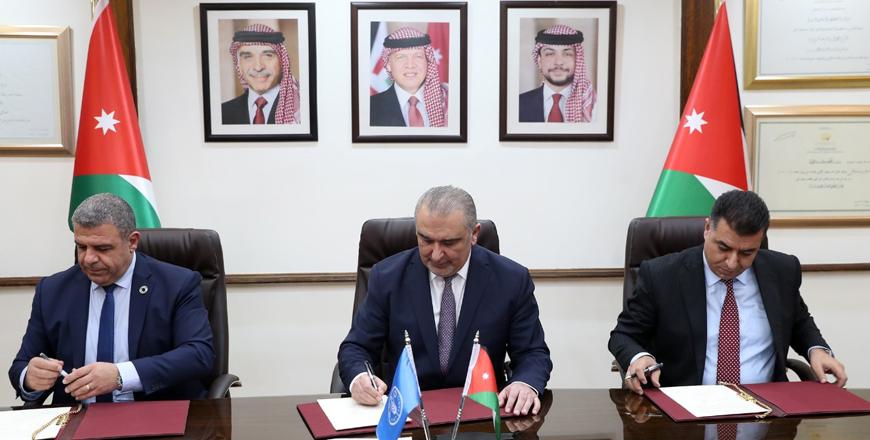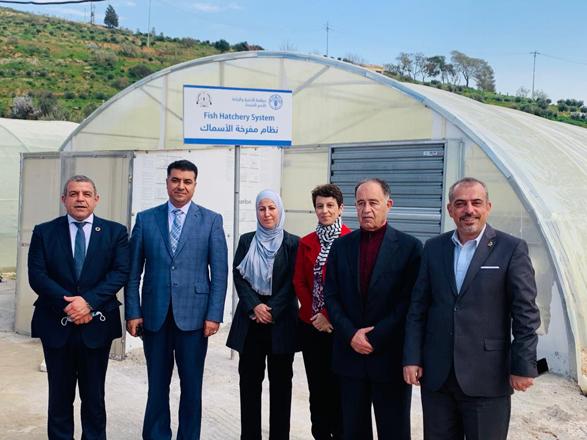You are here
Jordan, FAO sign agreement to improve water use efficiency in agriculture sector
By JT - Apr 15,2022 - Last updated at Apr 15,2022

Ministers and FAO officials pose for a photo during the signing ceremony of an agreement between Jordan and FAO to improve water use efficiency in the agriculture sector on Thursday (Petra photo)
AMMAN — The government on Thursday signed a project agreement with the UN Food and Agriculture Organisation (FAO) titled “Building Resilience to Cope with Climate Change in Jordan through Improving Water Use Efficiency in the Agriculture Sector” (BRCCJ).
The agreement was signed by Planning Minister Nasser Shraideh, Water Minister Mohammad Najjar, Agriculture Minister Khalid Hneifat, Environment Minister Muawieh Radaideh along with FAO representative in Jordan Nabil Assaf, according to a Planning Ministry statement.
During the signing ceremony, Shraideh expressed appreciation for FAO for securing a grant, amounting to $25 million, from the Green Climate Fund for this project.
The project will also be co-financed by the government represented by the ministries of Environment, Agriculture and Water, FAO and the United Nations Development Programme (UNDP), at a value of $8.25 million.
The $33.25 million project aims to enhance infrastructure to maximise the optimal use of water and rationalise its consumption, spread awareness related to dealing with water scarcity, and enable the private sector to market and sell technologies which serve water managing, saving and harvesting.
The project will be implemented in four governorates in the Dead Sea Basin: Madaba, Karak, Tafileh and Maan.
Hneifat highlighted the significance of the project and the importance of the grant provided to it to contribute to addressing the challenges of poverty, unemployment and the development of the governorates.
Radaideh noted that the project will be implemented “in line with Jordan’s Climate Change Policy (2013-2020) and National Adaptation Plan (2020) objectives”.
He added that the project will “benefit 212,416 people, 47 per cent of whom are women, as well as reducing groundwater withdrawal by 3 to 3.5 per cent and contributing up to 4.5 per cent to achieving water management objectives defined in the National Water Strategy”.
Assaf highlighted the scarcity of water resources as one of Jordan's main challenges and a limiting factor for economic development, adding that “climate change threatens the livelihoods of thousands of people who depend on agriculture for their well-being”.
UN Resident Coordinator Ghulam Ishaqzai and UNDP Resident Representative Randa Aboul Hosn referred to the distinguished relationship of UN agencies with Jordan and their readiness to continue working with the Kingdom.
Related Articles
AMMAN — The Ministry of Planning and International Cooperation, the Ministry of Agriculture and the Food and Agriculture Organisation (FAO)
AMMAN — Concerned ministers, in the presence of the Food and Agriculture Organisation (FAO) Representative in Jordan Nabil Assaf, on Sunday
AMMAN — The Representative of the Food and Agriculture Organisation of the United Nations (FAO) in Jordan Nabil Assaf, Agriculture Minister

















